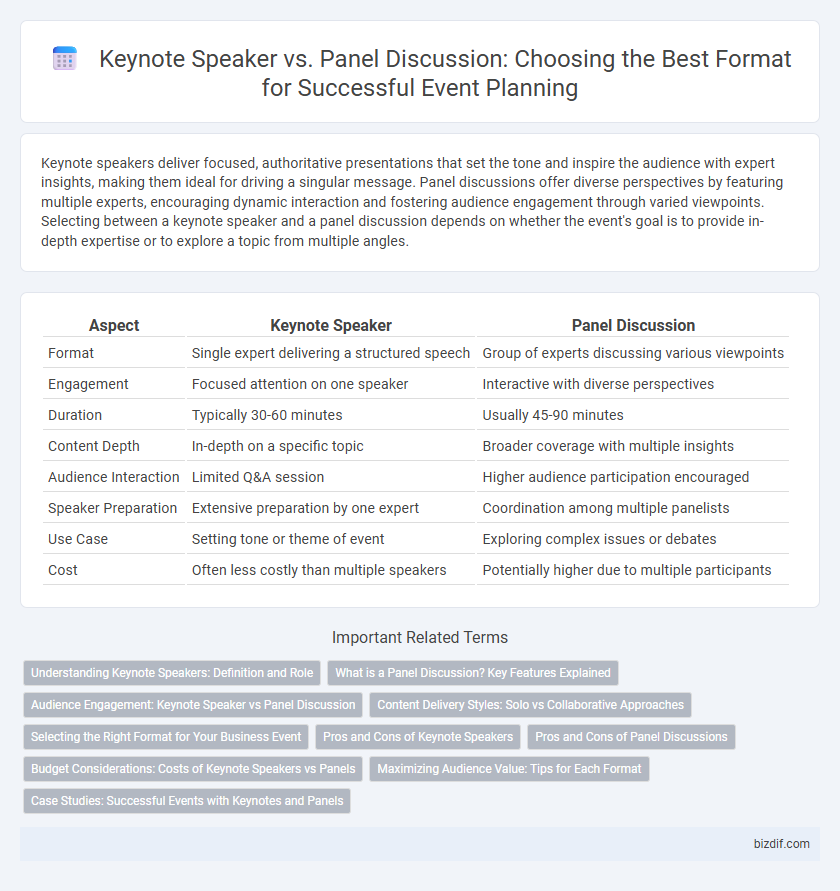Keynote speakers deliver focused, authoritative presentations that set the tone and inspire the audience with expert insights, making them ideal for driving a singular message. Panel discussions offer diverse perspectives by featuring multiple experts, encouraging dynamic interaction and fostering audience engagement through varied viewpoints. Selecting between a keynote speaker and a panel discussion depends on whether the event's goal is to provide in-depth expertise or to explore a topic from multiple angles.
Table of Comparison
| Aspect | Keynote Speaker | Panel Discussion |
|---|---|---|
| Format | Single expert delivering a structured speech | Group of experts discussing various viewpoints |
| Engagement | Focused attention on one speaker | Interactive with diverse perspectives |
| Duration | Typically 30-60 minutes | Usually 45-90 minutes |
| Content Depth | In-depth on a specific topic | Broader coverage with multiple insights |
| Audience Interaction | Limited Q&A session | Higher audience participation encouraged |
| Speaker Preparation | Extensive preparation by one expert | Coordination among multiple panelists |
| Use Case | Setting tone or theme of event | Exploring complex issues or debates |
| Cost | Often less costly than multiple speakers | Potentially higher due to multiple participants |
Understanding Keynote Speakers: Definition and Role
Keynote speakers deliver a central, impactful presentation that sets the tone and focus of an event, often sharing expert insights or inspiring narratives tailored to the audience. Their role is to engage attendees, convey the event's primary message, and provide thought leadership that aligns with the broader theme. Unlike panel discussions, which involve multiple participants exchanging ideas, keynote speeches offer a singular, authoritative voice designed to motivate and unify event objectives.
What is a Panel Discussion? Key Features Explained
A panel discussion is a structured conversation involving multiple experts or speakers who share diverse perspectives on a specific topic in front of an audience. Key features include a moderator guiding the dialogue, interactive Q&A sessions, and the dynamic exchange of ideas that encourage audience engagement. This format promotes varied viewpoints and collaborative insights, distinguishing it from a single-speaker keynote presentation.
Audience Engagement: Keynote Speaker vs Panel Discussion
Keynote speakers captivate audiences with compelling narratives and authoritative insights, creating a focused and immersive experience. Panel discussions foster dynamic interaction and diverse perspectives, encouraging audience participation and real-time engagement. Choosing between the two hinges on desired engagement style: authoritative depth versus collaborative dialogue.
Content Delivery Styles: Solo vs Collaborative Approaches
Keynote speakers deliver content through a focused, solo approach, providing a unified narrative that emphasizes expert insights and storytelling. Panel discussions employ a collaborative content delivery style, featuring multiple experts who share diverse perspectives and engage in dynamic dialogue. Choosing between these formats depends on the event's goals, whether prioritizing depth of expertise or breadth of viewpoints.
Selecting the Right Format for Your Business Event
Selecting the right format for a business event significantly impacts audience engagement and knowledge retention. Keynote speakers deliver focused, authoritative insights on a specific topic, ideal for setting the event's tone or introducing new concepts. Panel discussions foster diverse perspectives and interactive dialogue, making them effective for exploring complex issues or encouraging audience participation.
Pros and Cons of Keynote Speakers
Keynote speakers bring authoritative insight and a focused message that sets the tone for an event, providing clear direction and inspiration to attendees. Their advantages include the ability to engage a large audience with a unified theme and deliver expert knowledge in a structured format. However, drawbacks include limited audience interaction and potential over-reliance on one perspective, which may reduce diverse viewpoints compared to panel discussions.
Pros and Cons of Panel Discussions
Panel discussions offer diverse perspectives, fostering dynamic conversations and audience engagement while providing a platform for multiple experts to share insights simultaneously. Challenges include potential dominance by outspoken panelists, risk of off-topic digressions, and less control over message consistency compared to a keynote speaker. Effective moderation is essential to balance participation and maintain focus, ensuring clarity and value for attendees.
Budget Considerations: Costs of Keynote Speakers vs Panels
Keynote speakers typically demand higher fees due to their prominence, exclusivity, and preparation time, which can significantly impact event budgets. Panel discussions often prove more cost-effective, as they involve multiple experts sharing insights with shared or lower individual fees. Budget planners must weigh the value of a headline keynote's draw against the diverse perspectives and cost efficiency offered by a panel format.
Maximizing Audience Value: Tips for Each Format
Keynote speakers deliver focused, authoritative insights that set the tone and provide deep expertise on a specific topic, maximizing audience value through compelling storytelling and clear takeaways. Panel discussions offer diverse perspectives and dynamic interactions, enhancing audience engagement by fostering dialogue and exploring multiple viewpoints on complex issues. To maximize value, event planners should select keynote speakers with proven expertise and relatability, while curating panelists with complementary backgrounds and ensuring skilled moderation to balance participation.
Case Studies: Successful Events with Keynotes and Panels
Case studies from leading conferences reveal that keynote speakers effectively anchor events by delivering compelling, memorable messages that boost attendee engagement and brand recognition. In contrast, panel discussions foster dynamic interaction and diverse perspectives, driving deeper audience insight and networking opportunities, as seen in major industry summits. Successful event planners strategically combine keynotes to inspire and panels to facilitate dialogue, maximizing overall event impact and participant satisfaction.
Keynote speaker vs Panel discussion Infographic

 bizdif.com
bizdif.com